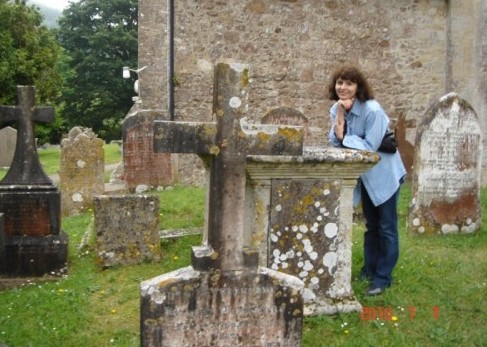
Writer Gail Gallant at a graveyard in Devon
If it takes one virtue above others to write a book, it’s courage. Because, really, there’s just so much to be frightened of.
Since I began writing fiction three years ago, I have been fearful. Not just sometimes, but every day. I’m also, sometimes, happy. I think of courage simply as the ability to function in spite of fear. Keeping calm and carrying on, more or less as you would if you weren’t so terribly afraid.
But you are afraid. Writing is scary.
Below are some things I fret about, not simultaneously, which would shut me down completely, but in clusters. Infinite combinations of twos and threes on any given day. I’ve left out the fears like Will I find an agent? And Will I find a publisher? And Will I have to file for bankruptcy? They’re just too obvious.
It’s not such a bad thing to scare yourself, I suppose. It’s better than shutting your eyes — and not knowing what’s out there.
1.
Readers will think that your main character is based on you, especially the neurotic bits.
2.
Your family and friends will think that the minor characters are based on them, especially the unflattering bits.
3.
Your old high school friends will recognize who your story’s heartthrob is based on. (And so will he.)
4.
No one who knows you will even read your book.
5.
Your book being published is going to change your life forever, catapulting you into a chaotic and uncontrollable circus of global attention, leading to tabloid gossip and abuse of prescription drugs.
6.
Your writing is so average and banal and derivative that the only change coming your way is what you’ll get from the counter clerk at Tim Hortons.
7.
The harsh physicality of writing — all that time at the computer — will result in back pain, a stiff neck, and headaches, in atrophied leg muscles, arthritic hands, and strained eyes. Hour after hour, day after day, for months at a time, writing is going to put you in an early grave.
8.
You will spend so much time alone, only interacting with your book, that eventually you won’t know how to talk to real people anymore. You won’t make eye contact, and others will suspect you of being depressed or distracted or vitamin-deprived or hypomanical. Or paranoid.
9.
You won’t be paranoid. People really will be talking about you.
10.
The very passage in your book that gave you the most pleasure when you wrote it will fail to affect anyone else that way. It won’t quite “work” for them.
11.
You will get so into the writing because it helps you to feel better about your life and forget that what counts when you’re a Writer is how you make your reader feel.
12.
Years have gone by since you thought up your story, and you almost had yourself convinced “it’s too late.” Now that you’ve begun … are you too damned old-looking to be a first-time author?
13.
You’re writing; you’re doing it. And you have to trust the process the way you trust the pilot who’s flying a plane. What choice do you have once you’re thirty thousand feet above the Atlantic? Everyone knows there’s no way that a seat cushion in Economy will keep you afloat. And the pilot? He’s just some guy.
And … oh yeah. The pilot is you.
* * *
GAIL GALLANT’s first novel, Apparition, will be published by Doubleday Canada next Fall, and its sequel, Absolution, the following year. They are, appropriately, ghost stories, of a romantic thriller variety, written for Young Adult readers and other fools for love and death. She also wrote a short memoir, “The Changeling,” published in The Walrus and nominated for a 2006 National Magazine Award. Warning: it’s pretty dark. But it explains a lot about where she’s coming from, supernaturally speaking.
From Sandra Shaw Homer in Costa Rica:
“Right on! This post was fun.”
As a closet writer, this article resonated deep inside me in the form of a warm belly laugh. Thank you for your precious insights!